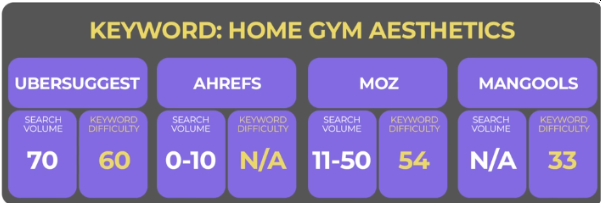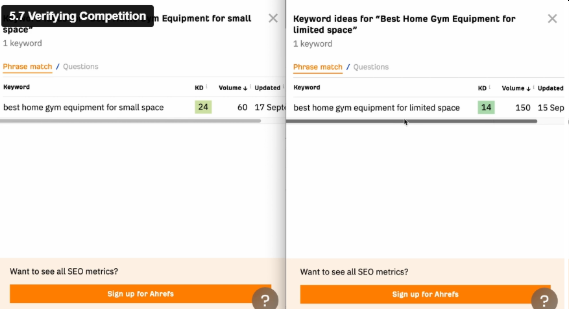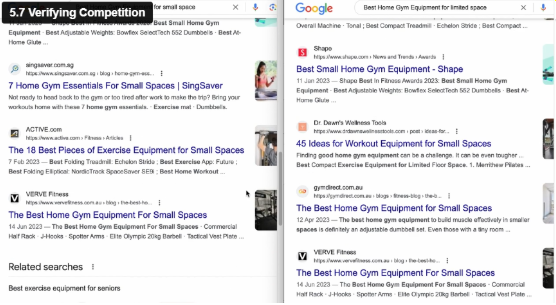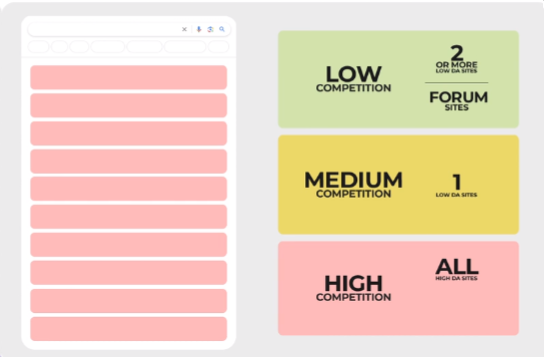Verifying keyword competition is crucial for any successful SEO strategy. It helps determine how difficult it will be to rank for a specific keyword and whether targeting it is worth the effort. High-competition keywords may require significant time and resources to outrank established websites, while low-competition keywords can offer quicker wins with less effort. By analysing factors such as search volume, domain authority of competing sites, and keyword difficulty scores, businesses can focus on keywords that provide the best balance of traffic potential and ranking feasibility.
Table of Contents
ToggleVerifying Keyword Competition
Welcome to this lesson on How to Know if a Keyword is competitive or not. By now, you should have a list of keywords in your spreadsheet and it’s time to work out if a keyword has a high, low or medium level of competitiveness. As I’ve mentioned before, if you have an Ahrefs account that will be the most accurate tool out there. But, if not I’m going to show you my method of determining the level of competitiveness of a keyword.

But first, I’m going to address why I do not use the Keyword Difficulty metric to measure the competition.
Let’s take for example, using the Ahrefs Keyword Generator. I’m assuming we’re all familiar with this tool by now. But, we’ll start by searching for “best home gym equipment for small space” and “best home gym equipment for limited space”. If we hit “Find Keywords for each, you will see that the first permutation has a Keyword Difficulty of 24 and the second is 14.

But, they both have similar search intent. If we just do a search on both Keywords. You will find that the article that are ranking for them are similar as well. Which is the difficuly number you take? That’s why I don’t focus too much on the KD provided by SEO tools.
There are several ways to check the competition, including using SEO tools like Ahrefs, SEMrush, or WordStream’s Free Keyword Tool to analyze keyword difficulty and competitor rankings.

Sure, it can give you a quick gauge, but you are missing out on the full picture.
Effective competitive keyword analysis helps businesses identify high-value keywords, assess ranking difficulty, and strategize smarter SEO campaigns for better visibility.
Verifying Competition Level (Our Method)
So, let me share with you: our method.And I just want to emphasise this, my method is not foolproof either. It works for me, it might not work for you. And you may have a better method.
With our method, we’ll be installing a Google Chrome extension. On Google search for “ubersuggest chrome extension”. click on the “Ubersuggest SEO and Keyword Discovery” and you want to install it on your brower by clicking “Add to Chrome”
You can use WordStream’s Free Keyword Tool to quickly discover high-performing keywords and optimize your SEO strategy with data-driven insights.

As soon as you have installed it, you see some detail on the search screen. You will see the Domain authority, the number of estimated visits to the page, the number of backlinks of each page. If you have an active Ahtefs account, they have a Chrome Extension as well that gives you similar data fields.
But, this is not all. We don’t want to do a search through a Google Account because the results might be skewed. What we want to do is search on a new incognito window. But, by default, the Chrome extension will not work on an incognito window unless you specify it.
So, at the top-right hand corner of your browser, click on the three dots, hover to <Google Password Manager> Extensions, unfortunately don’t appear on the screen, so if you see “Manage Extensions” click on it. Under the “Ubersuggest” click “Details” and look for the setting “Allow in Incognito” Turn it on. and you can open a new incognito window. Now do a search and you will see the chrome extension running.
Determining Site Authority
With this information, how do we determine the level of competitiveness? First we need to exclude the search features like the ads, the featured snippets, if any, the people also ask section. What you want to look at, are the first 10 organic results.
- High Authority Sites – DA 51+
- Moderate Authority – DA 21 – 50
- Low Authority – DA 20
If the first 10 is a mix of high authority sites and a mix of moderate authority as well as low authority sites, it means that the keyword has low competition.
It doesn’t matter, the proportion of High DAs vs Low DAs, but this is my theory: if you see one Low or Moderate DAs, just one, I would label the keyword as Medium Competition. But if there are two or more low or moderate authority sites, I would classify the keyword as Low. But, again, this is my theory and you can come up with your own depending on how well you understand your niche.
So, in this example: “best home gym equipment for limited space”. We have DA of 55, 89, 94, 93, 86 then we have 10 then 32, another 32 then 75. So, 3 low or moderate sites, on your keyword research spreadsheet, you wanna label this keyword as “Low” competition.
Keyword Clusters
But, what about the other keyword “best home gym equipment for small space”, Let’s search for it. We have quite similar results DA 91, 55, 89, 94, 93, 10, 40, 32. so basically, the same. So, in your spreadsheet you can also classify this as “Low” competition.
Now, I’ll give you a hypothetical scenario. Let’s assume that this keyword “best home gym equipment for small space” instead of having all this DAS of 10, 40 and 32. The top ten results are plastered with all the high authority sites. Then in that scenario this would be classified as “High” competition.
Verifying keyword competition allows you to assess ranking difficulty, identify opportunities, and focus on keywords that offer the best potential for SEO success.
Both are keywords with the same search intent. As this is a keyword cluster, I would classify it as “Low”.
Low Competition Scenario
I want to give you a Low Competition scenario. Let’s check out this keyword: “gym membership vs home gym”. Searcg for it and see we haave a Moderate Authority site at the top, high authority site, another high authority, moderate authority and most importantly, forum sites like Reddit or Quora. At any point, if the search results come with a forum site, we can label the keyword as Low Competition.
Now, let’s talk about keywords with High Competition. If the top ten of a keyword has only high authority sites it means that the keyword has a high level of competition.
Let’s look at another high competition keyword “weight management exercises”. Now you’d be surprised that this keyword has a low seqarch volume but the competition is super high. We have many high authority sites AND a government site. In this instane, although there is one low authority site. If a visitor sees lots of well-known names and a governemnt website, are they likely to click on a single low authority site. No!
To optimise your home page effectively, avoid relying on outdated SEO concepts like keyword stuffing and focus instead on user experience, mobile-friendliness, and high-quality content.
Conclusion
To recap, If you have multiple keywords with the sae meaning and search intent, select the keyword with the lowest competition as the main keyword in the group and you want to target that keyword in an article.

Verifying keyword competition is essential for choosing the right SEO strategy, helping you target keywords that balance search volume and ranking difficulty for optimal results.




